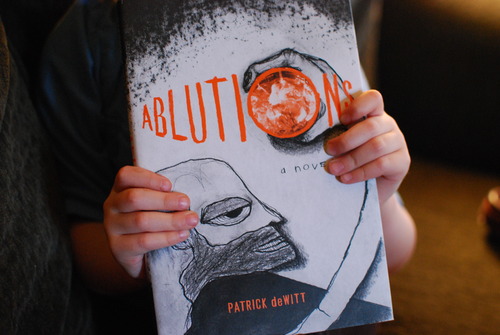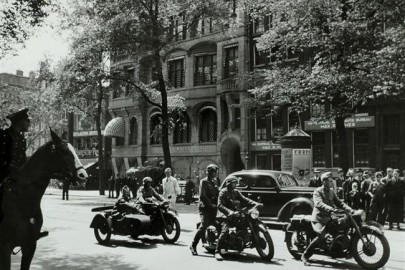Elberry enjoys an “unnervingly lucid” mix of horror and comedy…
This is an extremely funny book about booze, bars, violence, and horrible sex. Not new subjects but then how many could there be, in the 21st Century? In any case, deWitt’s manner is so peculiar, so arresting, he seems to exist without literary precedent or context. He just is. The achievement of Ablutions is one of tone: childlike, wondering, alert and insulated by alcohol and drugs; absorbed in the present, oblivious to the future, relieved of the past. It is a strangely magical state, when you see things just differently enough to wonder. So the barman hero and his enchanted vehicle:
You drive home drunk at the end of each night but the police have never stopped you because your car, a 1971 Ford LTD, is magical. It is a twenty-minute drive through empty streets and highways from the bar to your home and by rights you should have been arrested a hundred times over, but the car’s powers are such that even when police drive behind you they are rendered blind and deaf to your weaving and your squealing tires. You sometimes do not remember driving home at all and later find dents and scratches in the front and back fenders, but each morning you awake in your bed and not in a jail cell and you wonder if the car became magical only after you owned it or if it rolled off the assembly line this way.
The hero is akin to a medieval idiot saint, wandering through a world of violence and pain with drunken equanimity. As a barman he is entitled to free booze and wisely chooses Samuel Beckett’s drink of choice, Jameson’s. He is permanently drunk, but not too drunk to drive home in his magical car, or to observe the usual alcoholics and their squalid ways, with the childlike clarity of Eli Sisters. Full of grotesque incidents and drunken violence, the book could easily have become a Hunter S Thompson pastiche, were it not for the tone of detached innocence. It is not that the narrator is particularly nice; he is rather emotionally disengaged from his own narrative. He contemplates even his own appetites thus:
The warm wind runs off your torso and legs and your mind turns to the loveliness of narcotics and alcohol and women and you are shivering though you are not at all cold and you feel that you could cry now.
The second-person singular, used throughout, is one with this distance. One would not normally use the word “torso” so; it is a word one uses for autopsies. Likewise, who would use a phrase like “the loveliness of narcotics”? – the power comes from such unexpected conjunctions; and finally you feel the wording is just. So far under drink as this, perspective takes on a lucid weirdness. It is, however, an infernal vision; those for whom this is natural are unnatural beasts of the night:
He has been evicted, he says, but breaks into the apartment to sleep sitting up in the closet. The new tenants are due at any moment and he lives in unending fear of their arrival and hasn’t slept more than three hours a night for the past week and what little sleep he has had was riddled with nightmares. (He is standing by the sea watching two large red fish casually eating each other’s faces. Soon they are but two wagging, blood-spitting tails.) You extend your sympathies but feel in your heart that Curtis has found his station in life, that he belongs in a closest dreaming of murderous sea life, that he deserves to live in a state of perpetual unease.
The various alcoholics and drug addicts sink voluntarily deeper into degradation, observed by the narrator, likewise sinking. This is a squalid, predatory world, full of worthless scrounging drunks who expect the narrator to give them free drinks, and latch onto anyone they hope will pay their way. Curtis’ vision is appropriately cannibalistic. The characters and narrator offer themselves to the gods of booze and drugs, and seek out others to fund and prolong their sacrifice. Everything is sacrificed. As in Hunter S Thompson’s fantasies, the only way to survive is to maintain a cannonball-like momentum, charging indifferently through it all.
The book reads like a survivor’s memoir, with each section beginning “Discuss” as if the author had jotted down notes of “things to discuss” and then written it up, very quickly. It is, however, strangely coherent and funny, unnervingly lucid. Thus, one alcoholic’s seduction method:
Corey’s pickup method is to stare, with his little pig eyes, at the heads of unaccompanied women until they are made uncomfortable and ask him to stop; when he does not stop they collect their effects and move to another part of the bar, outside his field of vision. He does this again and again until there are only accompanied women within sight, and he drinks more tequila and begins looking at them, and they lean in to tell their cowboys and the room now turns to ugliness and the night begins its unraveling.
The magical vision is mainly dark; but it is irresistibly funny. Perhaps drinking Jameson’s can encourage a Beckettian perspective, for there is something of Beckett’s mesmerised horror here, horror and comedy both; and that is no small praise.











Why Elberry, what absolutely tiny hands you have… until I’d read this review, my most wanted book was The Sister’s Brothers, also by deWitt, and also reviewed by Mr Elberry. Ablutions has now jumped to the top of my reading wishlist instead. I note that you can buy a new paperback version at amazon for 1p, however the hardback pictured above is more
Yes, I’d like to read this after that. Sounds a bit like A Fan’s Notes by Fred Exley.
Wonderfully well-written review, if you don’t mind me saying. The conjunction of idiotically innocent saintliness and helpless dissolution for comic effect is also to be found in Steinbeck’s Tortilla Flat. But this sounds much more hard core than that almost whimsical work.
Ablutions is far funnier, truer, more thoughtful and sadder than anything I’ve read by Hunter S. Thompson. It’s a minor masterpiece and will, I think, be read long after Thompson is forgotten.